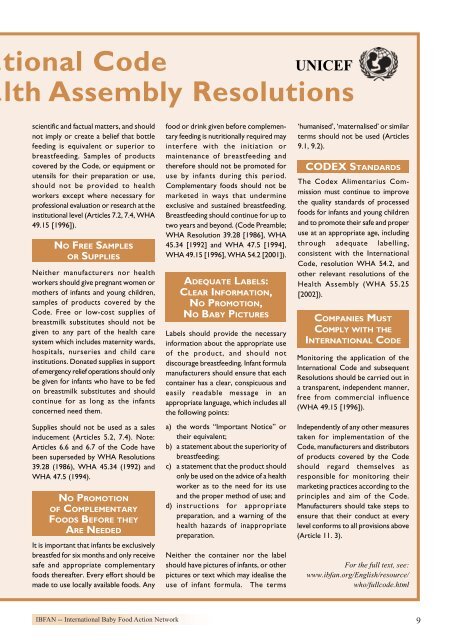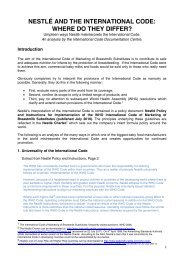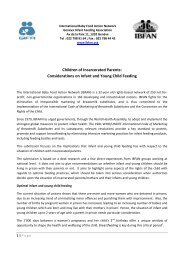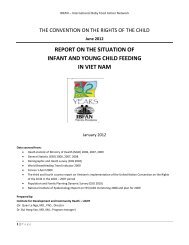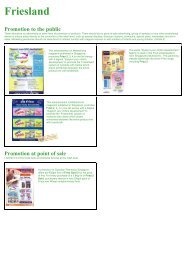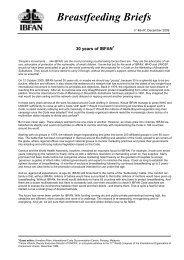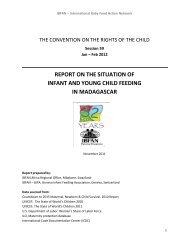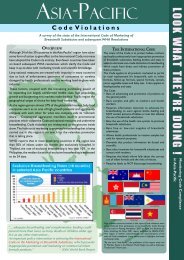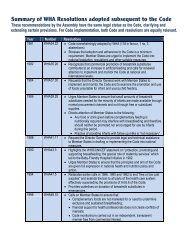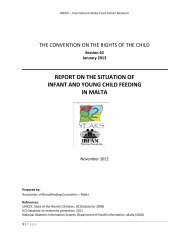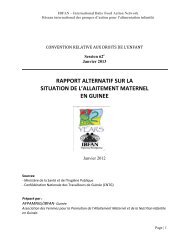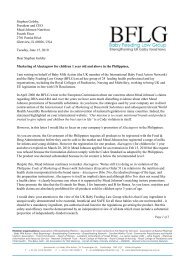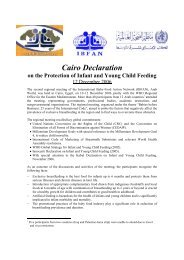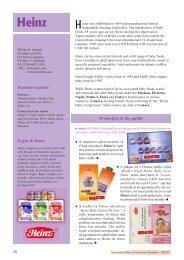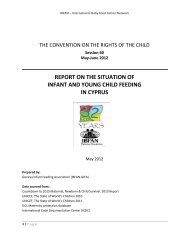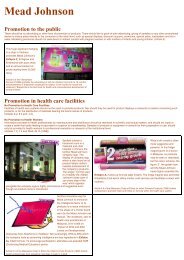You also want an ePaper? Increase the reach of your titles
YUMPU automatically turns print PDFs into web optimized ePapers that Google loves.
tional Code<br />
UNICEF<br />
lth Assembly Resolutions<br />
scientific and factual matters, and should<br />
not imply or create a belief that bottle<br />
feeding is equivalent or superior to<br />
breastfeeding. Samples of products<br />
covered by the Code, or equipment or<br />
utensils for their preparation or use,<br />
should not be provided to health<br />
workers except where necessary for<br />
professional evaluation or research at the<br />
institutional level (Articles 7.2, 7.4, WHA<br />
49.15 [1996]).<br />
NO FREE SAMPLES<br />
OR SUPPLIES<br />
Neither manufacturers nor health<br />
workers should give pregnant women or<br />
mothers of infants and young children,<br />
samples of products covered by the<br />
Code. Free or low-cost supplies of<br />
breastmilk substitutes should not be<br />
given to any part of the health care<br />
system which includes maternity wards,<br />
hospitals, nurseries and child care<br />
institutions. Donated supplies in support<br />
of emergency relief operations should only<br />
be given for infants who have to be fed<br />
on breastmilk substitutes and should<br />
continue for as long as the infants<br />
concerned need them.<br />
Supplies should not be used as a sales<br />
inducement (Articles 5.2, 7.4). Note:<br />
Articles 6.6 and 6.7 of the Code have<br />
been superseded by WHA Resolutions<br />
39.28 (1986), WHA 45.34 (1992) and<br />
WHA 47.5 (1994).<br />
NO PROMOTION<br />
OF COMPLEMENTARY<br />
FOODS BEFORE THEY<br />
ARE NEEDED<br />
It is important that infants be exclusively<br />
breastfed for six months and only receive<br />
safe and appropriate complementary<br />
foods thereafter. Every effort should be<br />
made to use locally available foods. Any<br />
<strong>IBFAN</strong> -- International Baby Food Action Network<br />
food or drink given before complementary<br />
feeding is nutritionally required may<br />
interfere with the initiation or<br />
maintenance of breastfeeding and<br />
therefore should not be promoted for<br />
use by infants during this period.<br />
Complementary foods should not be<br />
marketed in ways that undermine<br />
exclusive and sustained breastfeeding.<br />
Breastfeeding should continue for up to<br />
two years and beyond. (Code Preamble;<br />
WHA Resolution 39.28 [1986], WHA<br />
45.34 [1992] and WHA 47.5 [1994],<br />
WHA 49.15 [1996], WHA 54.2 [2001]).<br />
ADEQUATE LABELS:<br />
CLEAR INFORMATION,<br />
NO PROMOTION,<br />
Labels should provide the necessary<br />
information about the appropriate use<br />
of the product, and should not<br />
discourage breastfeeding. Infant formula<br />
manufacturers should ensure that each<br />
container has a clear, conspicuous and<br />
easily readable message in an<br />
appropriate language, which includes all<br />
the following points:<br />
a) the words “Important Notice” or<br />
their equivalent;<br />
b) a statement about the superiority of<br />
breastfeeding;<br />
c) a statement that the product should<br />
only be used on the advice of a health<br />
worker as to the need for its use<br />
and the proper method of use; and<br />
d) instructions for appropriate<br />
preparation, and a warning of the<br />
health hazards of inappropriate<br />
preparation.<br />
Neither the container nor the label<br />
should have pictures of infants, or other<br />
pictures or text which may idealise the<br />
use of infant formula. The terms<br />
‘humanised’, ‘maternalised’ or similar<br />
terms should not be used (Articles<br />
9.1, 9.2).<br />
CODEX STANDARDS<br />
The Codex Alimentarius Commission<br />
must continue to improve<br />
the quality standards of processed<br />
foods for infants and young children<br />
and to promote their safe and proper<br />
use at an appropriate age, including<br />
through adequate labelling,<br />
consistent with the International<br />
Code, resolution WHA 54.2, and<br />
other relevant resolutions of the<br />
Health Assembly (WHA 55.25<br />
[2002]).<br />
NO BABY PICTURES<br />
COMPANIES MUST<br />
COMPLY WITH THE<br />
INTERNATIONAL CODE<br />
Monitoring the application of the<br />
International Code and subsequent<br />
Resolutions should be carried out in<br />
a transparent, independent manner,<br />
free from commercial influence<br />
(WHA 49.15 [1996]).<br />
Independently of any other measures<br />
taken for implementation of the<br />
Code, manufacturers and distributors<br />
of products covered by the Code<br />
should regard themselves as<br />
responsible for monitoring their<br />
marketing practices according to the<br />
principles and aim of the Code.<br />
Manufacturers should take steps to<br />
ensure that their conduct at every<br />
level conforms to all provisions above<br />
(Article 11. 3).<br />
For the full text, see:<br />
www.ibfan.org/English/resource/<br />
who/fullcode.html<br />
9


